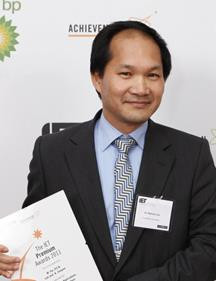科学研究
时间:2017年9月22日(周五)上午10:00
地点:江宁区自动化学院3号楼509报告厅
报告人:Prof. Patrick Chi-Kwong Luk, Cranfield University, UK
报告题目:Electric Machines and Drives –The enabling technology for the second wave of electrification
 Bio: Patrick Chi-Kwong Luk was born in Hong Kong. He received the BSc(Hons) in electrical engineering from Hong Kong Polytechnic University in 1983, the M.Phil. Degree in electrical engineering from Sheffield University, Sheffield, U.K., in 1989, and the Ph.D. degree in electrical engineering from the University of South Wales, U.K., in 1992. He joined Cranfield University, Bedford, U.K., in 2002, where he is a Chair Professor in electrical engineering and Head of the Electric Power and Drives Group, Power Engineering Centre.
Bio: Patrick Chi-Kwong Luk was born in Hong Kong. He received the BSc(Hons) in electrical engineering from Hong Kong Polytechnic University in 1983, the M.Phil. Degree in electrical engineering from Sheffield University, Sheffield, U.K., in 1989, and the Ph.D. degree in electrical engineering from the University of South Wales, U.K., in 1992. He joined Cranfield University, Bedford, U.K., in 2002, where he is a Chair Professor in electrical engineering and Head of the Electric Power and Drives Group, Power Engineering Centre.
He engages in fundamental and applied research in electric machines and power electronic drives, renewable energy systems, and more-electric architectures in electric vehicles and aircraft. He has been the Motor Theme leader within two UK consortia with a collective funding of over £4.5M to help develop a UK-based capability for next-generation sustainable electric traction machines for transportation. He also leads the development of a novel drive system for future vehicle-to-smart grid systems within a £1.2M UK-China consortium that involves leading academic groups, research institutions and utility companies from both countries.
He is the recipient of a number of prestigious awards including the 2011 IET Premium Award in Electric Power Applications and the Excellence Award by KTN Network in 2009. He is the co-holder of 10 GB and US patents and applications on electric drives, and has over 200 publications and several book chapters. A Senior IEEE member, he actively volunteers his time as the Chairperson for IEEE UKRI for Professional Communications Chapter, and IEEE UK&RI Power Electronics Chapter. He is an associate editor for IEEE Transactions on Power Electronics, and IET Journal for Renewable Power Generation.
Abstract: This seminar talk will look at how electric machines play a central role in a new wave of electrification that is spreading through several application areas. In renewable energy applications, various forms of rotating and linear machines that are of permanent magnet or non-permanent magnet types have been designed to match the wind, wave, hydro and tidal energy. In electrification of transportation, electric traction machines face the competing and simultaneous demands of high power and torque density, high efficiency over a wide speed range, high reliability and low cost/kW. In addition, it is critical that the supply chain of electric machines is secure and sustainable. In aerospace industry, the challenges around noise, emission and fuel efficiency have prompted a new form of electrification – E-Thrust, which looks into developing superconducting machines to replace jet-engines in a 30-year horizon.
Throughout the talk, there will be highlights on Cranfield University’s leading roles in setting out the electrification agenda and in contributing to the solutions in meeting these challenges within key national and international research consortia.